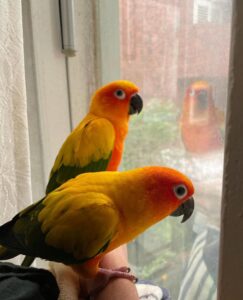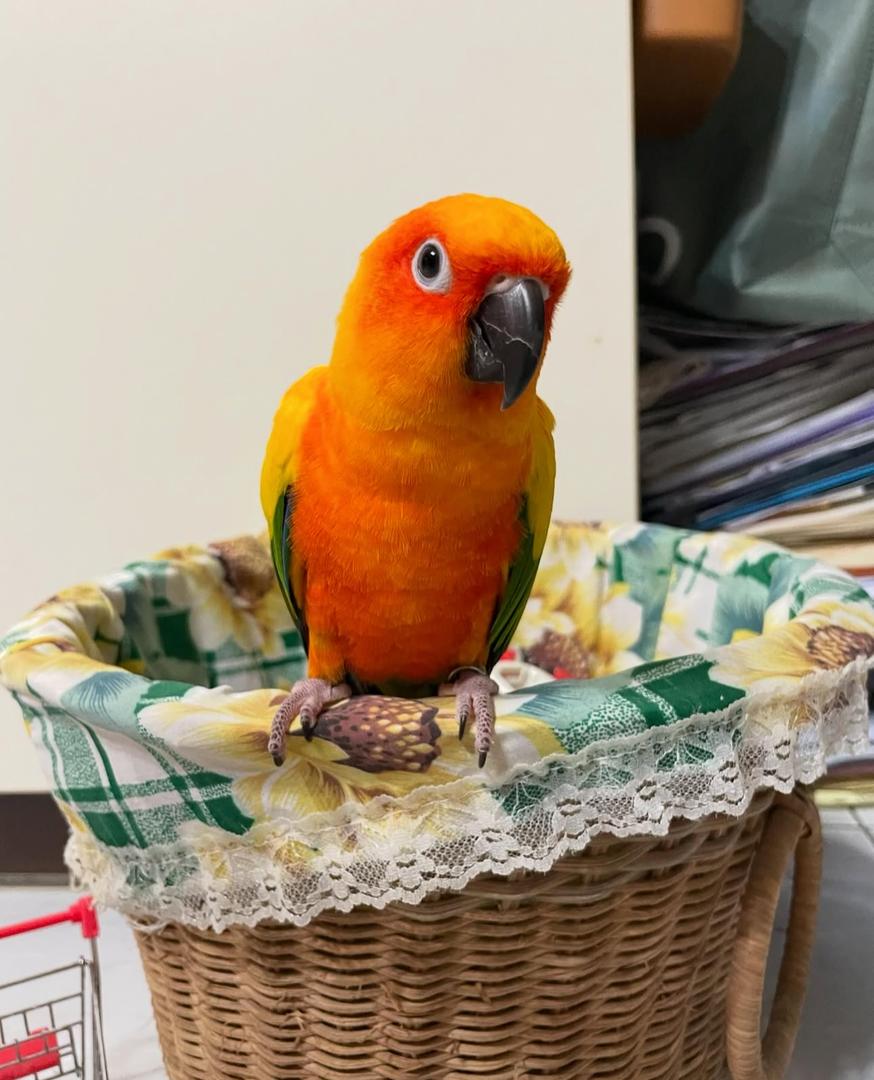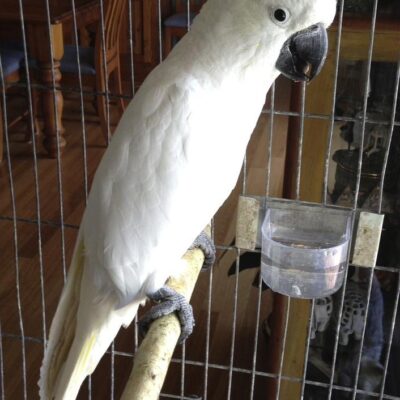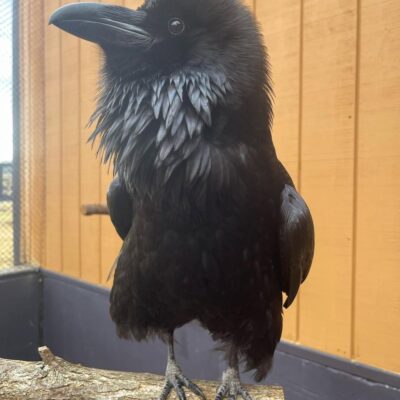Description
Sun Conure Parrots: A Complete Guide on Care, Personality, and More

Introduction
The sun conure, also known as the sun parakeet, is a captivating and vibrant parrot that has become a favorite among bird enthusiasts. These energetic and intelligent birds make excellent pets, particularly for those who are prepared for the commitment they require. While their playful personalities and striking colors are a draw, they do come with some specific care needs, particularly in terms of noise and socialization.
Quick Facts About Sun Conures:
- Common Names: Sun conure, sun parakeet
- Scientific Name: Aratinga solstitialis
- Size: 12 inches (approx. 30 cm)
- Lifespan: 15 to 30 years in captivity
Native Habitat and History
Originating from northeastern South America, sun conures are found in Venezuela, northern Brazil, and Guyana. They typically thrive in tropical forests, palm groves, and even dry savanna woodlands. Despite their beauty, their population is shrinking, largely due to habitat destruction and the pet trade. As a result, these birds are now considered endangered, and efforts to protect them are essential.
Personality and Behavior
Sun conures are playful, affectionate, and often form strong bonds with their human companions. They enjoy performing tricks and engaging in active play. With their lively nature, they thrive in households where they can interact frequently with their owners. However, this breed is not for first-time bird owners due to their demanding care needs.
While sun conures are known for their sweetness, they can be quite loud and are capable of making very high-pitched calls. This can be a challenge in smaller living spaces like apartments, as their volume can become disruptive. Their calls, used in the wild to signal important events, are hard to manage despite training efforts.
Physical Appearance
Sun conures are renowned for their stunning, colorful plumage. They display bright oranges, yellows, and touches of green and blue as they mature. Juvenile birds, however, have a more subdued olive-green coloration, gradually transitioning to the vibrant hues seen in adults by around 18 months to two years. Male and female sun conures are nearly identical in appearance, and sex identification requires genetic testing or surgical methods.
Care and Environment
Sun conures are energetic birds that need ample space to explore and play. It’s important to provide them with a large cage (at least 30 inches by 30 inches with a height of 36 inches), as well as access to safe, out-of-cage areas for exercise. This bird loves to be physically active, so regular interaction outside the cage is essential for its happiness and well-being.
They also enjoy a variety of toys and physical activities like climbing, playing, and foraging. Consider placing a play gym or perch near their cage to keep them mentally and physically engaged. Positive reinforcement is key in training sun conures, and they respond well to rewards-based learning.
Health Considerations
Like many parrots, sun conures are prone to a variety of health issues, including feather picking, which may indicate boredom or lack of attention. They can also suffer from specific avian diseases such as proventricular dilatation disease (PDD), psittacine beak and feather disease (PBFD), and psittacosis, among others. Regular visits to an avian vet are recommended to ensure early detection of any potential issues.
Diet and Nutrition
In the wild, sun conures primarily eat fruits, seeds, and nuts. In captivity, they should be provided with a balanced pellet-based diet supplemented by fresh fruits, leafy greens, and vegetables. Offering a variety of healthy foods is crucial, as these birds have high energy needs. Avoid feeding them foods that are toxic to birds, such as chocolate, caffeine, and salty snacks.
Exercise Needs
Sun conures are active by nature and require daily exercise to remain healthy and happy. Ideally, they should be allowed at least 3 hours of out-of-cage time each day. Interactive toys like wooden blocks, bells, and shreddable toys are excellent for providing mental stimulation. Keep in mind that these birds are highly intelligent, so they benefit from having their environment enriched to prevent boredom.
The Pros and Cons of Owning a Sun Conure
Pros:
- Affectionate, social, and playful
- Highly trainable and enjoy learning tricks
- Gorgeous, brightly colored plumage
Cons:
- Very loud; not suitable for apartments or close quarters
- May nip, especially when startled or bored
- Limited talking ability compared to other parrots
Where to Adopt or Purchase
If you’re interested in adding a sun conure to your family, it’s essential to find a reputable source. Sun conures can cost anywhere from $800 and up. You can adopt from:
- Sun Conure breeders (ensure they are well-established)
- Petfinder or rescue organizations like Rescue the Birds
Final Thoughts
Sun conures are charming, intelligent birds with big personalities and even bigger social needs. While they require significant attention, their loyalty and vibrant nature make them an incredibly rewarding companion for the right owner.
Frequently Asked Questions
1. Are sun conures good pets?
Yes, sun conures make affectionate and interactive pets, but they require a committed owner due to their social nature and noise level.
2. Do sun conures talk?
They are not known for speaking as much as other parrots but can mimic sounds such as doorbells or microwave buzzers.
3. Do sun conures like being held?
Absolutely! Sun conures are cuddly and enjoy interacting with their human companions. They love attention and affection.




